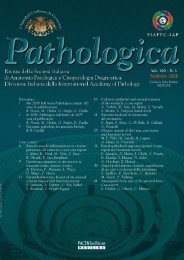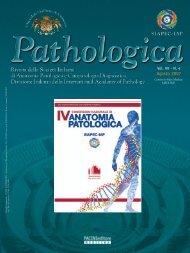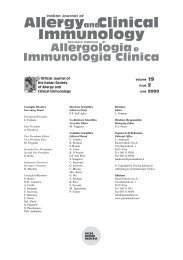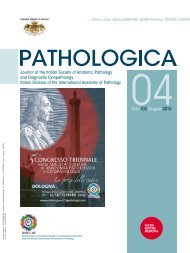Sabato 27 ottobre 2012 - Pacini Editore
Sabato 27 ottobre 2012 - Pacini Editore
Sabato 27 ottobre 2012 - Pacini Editore
Create successful ePaper yourself
Turn your PDF publications into a flip-book with our unique Google optimized e-Paper software.
252<br />
Predictive factors in colorectal carcinoma<br />
beyond KrAS<br />
A. Scarpa, V. Corbo<br />
Dipartimento di Patologia e Diagnostica, Policlinico GB Rossi, Università<br />
di Verona<br />
EGFR targeted monoclonal antibodies (cetuximab and panitumumab)<br />
have paved the way to the individualized treatments<br />
of metastatic colorectal cancer (mCRC). KRAS mutations<br />
emerged as the major negative predictor of response to those<br />
therapies. Mutations of KRAS occur in about 40% of mCRCs<br />
thus enabling for the selection of patients that might respond<br />
to anti-EGFR treatments. Unfortunately, the concept of a<br />
binary relationship between mutations in a given gene and<br />
response to therapy is not valid for mCRCs. Indeed, KRAS<br />
mutations testing showed high specificity but low sensitivity.<br />
A genetic basis for that failure has been recently demonstrated<br />
by studies focusing on additional genes involved in downstream<br />
EGFR signaling. Oncogenic mutations of BRAF or<br />
PIK3CA and mutations of the tumor suppressor PTEN have<br />
emerged as additional negative predictive markers. mCRCs<br />
lacking alterations of those genes (defined “quadruple negative”)<br />
have the highest probability to respond to anti-EGFR<br />
therapies. Very recent evidences showing that distinct mutations<br />
in a single cancer gene (such as codon-specific mutations<br />
of PIK3CA) might have different roles in response<br />
to therapy further complicated the scenario. However, the<br />
effective translation of these findings into clinical practice<br />
will empower the selection of patients eligible for anti-EGFR<br />
therapies. At the same time, despite genetic analysis of tumor<br />
samples are now part of the work of most pathology departments,<br />
the uncovering of the genetic milieu of individual<br />
colorectal cancer pose new challenges: testing simultaneously<br />
multiple genes in individual tumors using limited amount<br />
of tissue samples such as biopsy. The development of very<br />
sensitive and informative assay platforms is therefore mandatory.<br />
In line with this, a newly founded European Consortium<br />
coordinates a multi-institutional effort for the development<br />
and the implementation of a dedicated multi-gene panel test<br />
to be used for therapy decision and prognostic stratification<br />
in colon cancer.<br />
Predittività nel carcinoma mammario:<br />
uno sguardo oltre i fattori convenzionali<br />
A. Sapino<br />
Paper not received<br />
CONGRESSO aNNualE di aNatOmia patOlOGiCa SiapEC – iap • fiRENzE, 25-<strong>27</strong> OttOBRE <strong>2012</strong><br />
<strong>Sabato</strong> <strong>27</strong> <strong>ottobre</strong> <strong>2012</strong><br />
Sala Botticelli - 11.30-12.30<br />
Fattori predittivi molecolari<br />
Moderatori: Antonio Marchetti (Chieti), Giancarlo Troncone (Napoli)<br />
Analysis of egfr mutations in circulating tumor<br />
cells by massively parallel sequencing<br />
F. Buttitta<br />
Cardiovascular and Oncological Molecular Medicine Unit, Ce.S.I.<br />
(Centro Scienze dell’Invecchiamento)- University “G. d’Annunzio”,<br />
Chieti<br />
The management of patients with advanced non-small cell<br />
lung cancer (NSCLC) is currently based on the assessment of<br />
EGFR mutations. The mutation test is routinely performed on<br />
resected neoplastic tissues, biopsies or cytological samples. For<br />
several patients with advanced lung cancer or with progressive<br />
disease, it can be a challenge to obtain biological material for<br />
molecular analysis. Circulating tumor cells (CTC) are rare<br />
cells detectable in the blood of neoplastic patients and their<br />
enumeration has been shown to correlate with clinical outcome<br />
in patients with several types of malignancies. Furthermore,<br />
CTCs appear to be a non-invasive source of tumor cells, providing<br />
real-time information on biomarker status without the<br />
need for invasive re-biopsy. Over the last few years, a set of<br />
novel technologies for CTCs detection has emerged, including<br />
nucleic-acid-based and cytometric approaches. The first class<br />
of methods is predominantly represented by very sensitive<br />
PCR-based techniques for the detection of specific DNA or<br />
RNA sequences. More recently, there has been a shift towards<br />
cytometric procedures because these methods allow the cells<br />
to maintain integrity in order to be identified and counted. The<br />
most widely used CTC detection platform is the CellSearch<br />
system (Veridex LLC, Huntingdon Valley, PA, USA), which<br />
is the only technology to have received FDA approval for the<br />
enumeration of CTC in whole blood of patients affected by<br />
breast, prostate and colon cancer. CellSearch platform utilizes<br />
a semi-automated immunomagnetic bead-based separation to<br />
enrich CTCs. However, CTCs isolation is until now a challenge,<br />
because they occur at very low concentration of one cell<br />
in the background of millions of white blood cells. Therefore,<br />
their molecular characterization requires extremely sensitive<br />
and specific procedures. We decided to analyze EGFR mutation<br />
in CTCs isolated from plasma of a series of lung cancer<br />
patients. The CTCs enriched by CellSearch platform were<br />
subsequently analyzed by massively parallel sequencing on GS<br />
Junior 454-Roche, a novel approach that can allow the detection<br />
of genetic mutations even if they are present in a minority<br />
of DNA molecules. This platform is able to run thousands of<br />
gene sequences per sample from a single PCR and therefore<br />
it is an ideal approach for gene sequencing of rare DNA molecules,<br />
such as those extracted from circulating tumor cells in<br />
a high background of white cells.<br />
Le mutazioni del gene BrAF nel trattamento del<br />
melanoma metastatico<br />
F. Castiglione<br />
Paper not received







